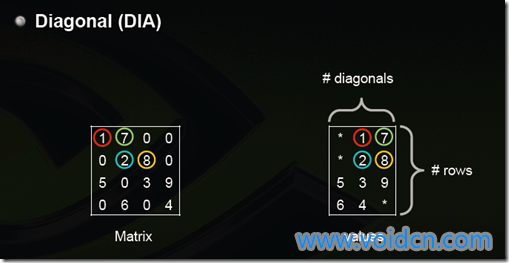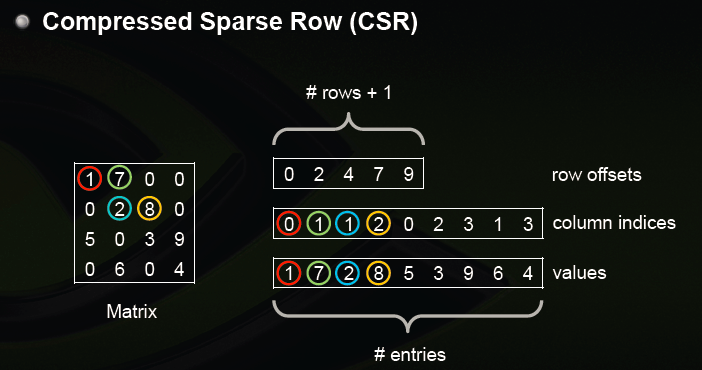稀疏矩陣之python實現
工程實踐中,多數情況下,大矩陣一般都為稀疏矩陣,所以如何處理稀疏矩陣在實際中就非常重要。本文以python裡中的實現為例,首先來探討一下稀疏矩陣是如何儲存表示的。
1.sparse模組初探
python中scipy模組中,有一個模組叫sparse模組,就是專門為了解決稀疏矩陣而生。本文的大部分內容,其實就是基於sparse模組而來的。
第一步自然就是匯入sparse模組
>>> from scipy import sparse然後help一把,先來看個大概
>>> help(sparse)直接找到我們最關心的部分:
Usage information
=================
There are seven 通過這段描述,我們對sparse模組就有了個大致的瞭解。sparse模組裡面有7種儲存稀疏矩陣的方式。接下來,我們對這7種方式來做個一一介紹。
2.coo_matrix
coo_matrix是最簡單的儲存方式。採用三個陣列row、col和data儲存非零元素的資訊。這三個陣列的長度相同,row儲存元素的行,col儲存元素的列,data儲存元素的值。一般來說,coo_matrix主要用來建立矩陣,因為coo_matrix無法對矩陣的元素進行增刪改等操作,一旦矩陣建立成功以後,會轉化為其他形式的矩陣。
>>> row = [2,2,3,2]
>>> col = [3,4,2,3]
>>> c = sparse.coo_matrix((data,(row,col)),shape=(5,6))
>>> print c.toarray()
[[0 0 0 0 0 0]
[0 0 0 0 0 0]
[0 0 0 5 2 0]
[0 0 3 0 0 0]
[0 0 0 0 0 0]]稍微需要注意的一點是,用coo_matrix建立矩陣的時候,相同的行列座標可以出現多次。矩陣被真正建立完成以後,相應的座標值會加起來得到最終的結果。
3.dok_matrix與lil_matrix
dok_matrix和lil_matrix適用的場景是逐漸新增矩陣的元素。doc_matrix的策略是採用字典來記錄矩陣中不為0的元素。自然,字典的key存的是記錄元素的位置資訊的元祖,value是記錄元素的具體值。
>>> import numpy as np
>>> from scipy.sparse import dok_matrix
>>> S = dok_matrix((5, 5), dtype=np.float32)
>>> for i in range(5):
... for j in range(5):
... S[i, j] = i + j
...
>>> print S.toarray()
[[ 0. 1. 2. 3. 4.]
[ 1. 2. 3. 4. 5.]
[ 2. 3. 4. 5. 6.]
[ 3. 4. 5. 6. 7.]
[ 4. 5. 6. 7. 8.]]lil_matrix則是使用兩個列表儲存非0元素。data儲存每行中的非零元素,rows儲存非零元素所在的列。這種格式也很適合逐個新增元素,並且能快速獲取行相關的資料。
>>> from scipy.sparse import lil_matrix
>>> l = lil_matrix((6,5))
>>> l[2,3] = 1
>>> l[3,4] = 2
>>> l[3,2] = 3
>>> print l.toarray()
[[ 0. 0. 0. 0. 0.]
[ 0. 0. 0. 0. 0.]
[ 0. 0. 0. 1. 0.]
[ 0. 0. 3. 0. 2.]
[ 0. 0. 0. 0. 0.]
[ 0. 0. 0. 0. 0.]]
>>> print l.data
[[] [] [1.0] [3.0, 2.0] [] []]
>>> print l.rows
[[] [] [3] [2, 4] [] []]由上面的分析很容易可以看出,上面兩種構建稀疏矩陣的方式,一般也是用來通過逐漸新增非零元素的方式來構建矩陣,然後轉換成其他可以快速計算的矩陣儲存方式。
4.dia_matrix
這是一種對角線的儲存方式。其中,列代表對角線,行代表行。如果對角線上的元素全為0,則省略。
如果原始矩陣是個對角性很好的矩陣那壓縮率會非常高。
找了網路上的一張圖,大家就很容易能看明白其中的原理。
5.csr_matrix與csc_matrix
csr_matrix,全名為Compressed Sparse Row,是按行對矩陣進行壓縮的。CSR需要三類資料:數值,列號,以及行偏移量。CSR是一種編碼的方式,其中,數值與列號的含義,與coo裡是一致的。行偏移表示某一行的第一個元素在values裡面的起始偏移位置。
同樣在網路上找了一張圖,能比較好反映其中的原理。
看看在python裡怎麼使用:
>>> from scipy.sparse import csr_matrix
>>> indptr = np.array([0, 2, 3, 6])
>>> indices = np.array([0, 2, 2, 0, 1, 2])
>>> data = np.array([1, 2, 3, 4, 5, 6])
>>> csr_matrix((data, indices, indptr), shape=(3, 3)).toarray()
array([[1, 0, 2],
[0, 0, 3],
[4, 5, 6]])怎麼樣,是不是也不是很難理解。
我們再看看文件中是怎麼說的
Notes
| -----
|
| Sparse matrices can be used in arithmetic operations: they support
| addition, subtraction, multiplication, division, and matrix power.
|
| Advantages of the CSR format
| - efficient arithmetic operations CSR + CSR, CSR * CSR, etc.
| - efficient row slicing
| - fast matrix vector products
|
| Disadvantages of the CSR format
| - slow column slicing operations (consider CSC)
| - changes to the sparsity structure are expensive (consider LIL or DOK)不難看出,csr_matrix比較適合用來做真正的矩陣運算。
至於csc_matrix,跟csr_matrix類似,只不過是基於列的方式壓縮的,不再單獨介紹。


